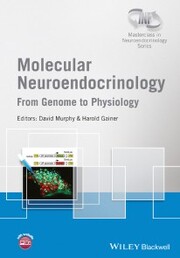Detailansicht
Molecular Neuroendocrinology
eBook - From Genome to Physiology, Wiley-INF Masterclass in Neuroendocrinology Series
ISBN/EAN: 9781118760338
Umbreit-Nr.: 9023425
Sprache:
Englisch
Umfang: 488 S., 30.46 MB
Format in cm:
Einband:
Keine Angabe
Erschienen am 24.12.2015
Auflage: 1/2015
E-Book
Format: EPUB
DRM: Adobe DRM
- Zusatztext
- <p><i>Molecular Neuroendocrinology: From Genome to Physiology</i>, provides researchers and students with a critical examination of the steps being taken to decipher genome complexity in the context of the expression, regulation and physiological functions of genes in neuroendocrine systems.</p><p>The 19 chapters are divided into four sectors: A) describes and explores the genome, its evolution, expression and the mechanisms that contribute to protein, and hence biological, diversity. B) discusses the mechanisms that enhance peptide and protein diversity beyond what is encoded in the genome through post-translational modification. C) considers the molecular tools that todays neuroendocrinologists can use to study the regulation and function of neuroendocrine genes within the context of the intact organism. D) presents a range of case studies that exemplify the state-of-the-art application of genomic technologies in physiological and behavioural experiments that seek to better understand complex biological processes.</p><p><br /> Written by a team of internationally renowned researchers<br /> Both print and enhanced e-book versions are available<br /> Illustrated in full colour throughout</p><p>This is the third volume in a new Series Masterclass in Neuroendocrinology , a co- publication between Wiley and the INF (International Neuroendocrine Federation) that aims to illustrate highest standards and encourage the use of the latest technologies in basic and clinical research and hopes to provide inspiration for further exploration into the exciting field of neuroendocrinology.</p><p>Series Editors: John A. Russell, University of Edinburgh, UK and William E. Armstrong, The University of Tennessee, USA</p>
- Kurztext
- Molecular Neuroendocrinology: From Genome to Physiology, provides researchers and students with a critical examination of the steps being taken to decipher genome complexity in the context of the expression, regulation and physiological functions of genes in neuroendocrine systems. The 19 chapters are divided into four sectors: A) describes and explores the genome, its evolution, expression and the mechanisms that contribute to protein, and hence biological, diversity. B) discusses the mechanisms that enhance peptide and protein diversity beyond what is encoded in the genome through post-translational modification. C) considers the molecular tools that today&rsquo;s neuroendocrinologists can use to study the regulation and function of neuroendocrine genes within the context of the intact organism. D) presents a range of case studies that exemplify the state-of-the-art application of genomic technologies in physiological and behavioural experiments that seek to better understand complex biological processes. &bull;&nbsp;Written by a team of internationally renowned researchers&bull;&nbsp;Both print and enhanced e-book versions are available&bull;&nbsp;Illustrated in full colour throughout This is the third volume in a new Series&nbsp; &lsquo;Masterclass in Neuroendocrinology&rsquo; , a co- publication between Wiley and the INF (International Neuroendocrine Federation) that aims to illustrate highest standards and encourage the use of the latest technologies in basic and clinical research and hopes to provide inspiration for further exploration into the exciting field of neuroendocrinology. Series Editors: John A. Russell, University of Edinburgh, UK and William E. Armstrong, The University of Tennessee, USA
- Autorenportrait
- <p><b>Professor David Murphy, University of Bristol, UK</b><br />As part of The Molecular Neueroendocrinology Research Group, Professor Murphy uses gene discovery and transfer techniques to study the neuronal regulation of the cardiovascular system in health and disease.</p><p><b>Dr Harold Gainer, National Institute of Neurological Disorders and Stroke (NINDS), USA</b><br />Dr Gainer's research focuses on the mechanisms involved in the establishment and maintenance of specific peptidergic neuronal phenotypes in the central nervous system.</p>
